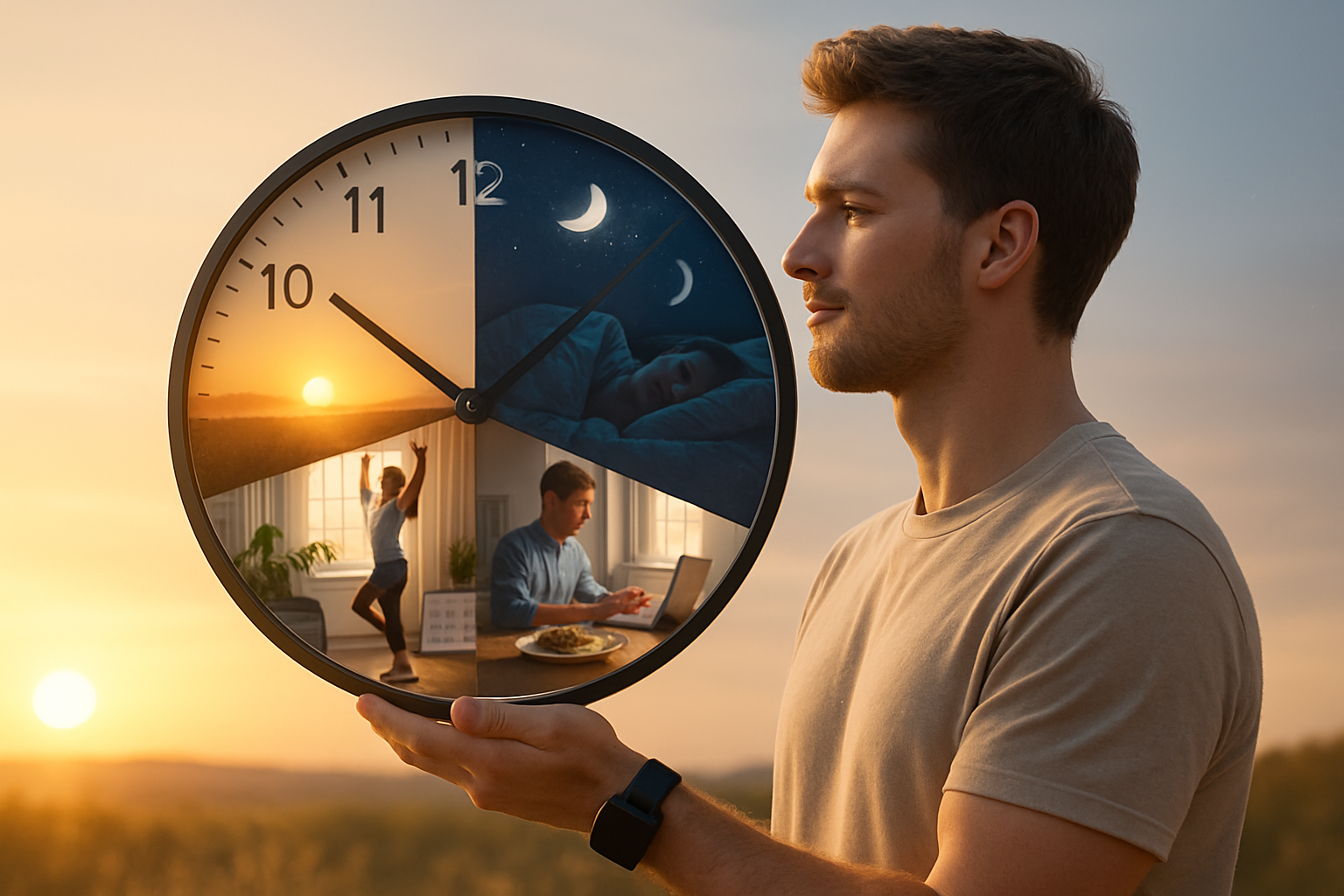Chronobiology: The Science of Your Internal Clock
Imagine waking up feeling refreshed without an alarm, tackling your most challenging tasks at peak performance times, and drifting off to sleep effortlessly each night. What if your daily routines could be perfectly synchronized with your body's natural rhythms? Welcome to the fascinating world of chronobiology, where science meets the intricate dance of our internal biological clocks.

The Ticking of Our Internal Clocks
At the heart of chronobiology lies the concept of circadian rhythms—our body’s natural 24-hour cycles. These rhythms are orchestrated by a master clock in our brain, known as the suprachiasmatic nucleus (SCN), which coordinates a network of peripheral clocks throughout our body. This intricate system regulates crucial processes such as sleep-wake cycles, hormone release, body temperature, and even gene expression.
The discovery of circadian rhythms dates back to the 18th century when the French astronomer Jean-Jacques d’Ortous de Mairan observed that mimosa plants continued to open and close their leaves in a daily rhythm, even when kept in constant darkness. This groundbreaking observation laid the foundation for modern chronobiology, which has since expanded to encompass a wide range of biological rhythms, from daily cycles to seasonal changes.
Chronotypes: Are You a Lark or an Owl?
One of the most intriguing aspects of chronobiology is the concept of chronotypes—individual variations in circadian rhythms that influence our optimal times for sleep, work, and other activities. While most people fall somewhere in the middle, about 40% of the population can be classified as either morning larks or night owls.
Morning larks, also known as early chronotypes, tend to wake up early, feel most alert in the morning, and prefer to go to bed earlier. Night owls, or late chronotypes, are more energetic in the evening, often staying up late and struggling with early mornings. Understanding your chronotype can help you align your daily schedule with your body’s natural rhythms, potentially improving your productivity, mood, and overall well-being.
The Health Implications of Circadian Disruption
In our modern 24/7 society, many of us live in a state of constant circadian disruption. Artificial lighting, irregular sleep schedules, and shift work can all throw our internal clocks out of sync, leading to a condition known as circadian misalignment. This misalignment has been linked to a host of health issues, including:
-
Increased risk of obesity and metabolic disorders
-
Higher rates of cardiovascular disease
-
Compromised immune function
-
Elevated risk of certain cancers
-
Increased susceptibility to mood disorders and cognitive decline
Research has shown that even small disruptions to our circadian rhythms, such as those caused by daylight saving time changes, can have measurable impacts on our health and performance. A study published in the New England Journal of Medicine found a significant increase in traffic accidents on the Monday following the spring time change, highlighting the far-reaching effects of circadian disruption.
Chronotherapy: Timing Medicine for Maximum Efficacy
One of the most exciting applications of chronobiology is in the field of medicine. Chronotherapy, the practice of timing medical treatments to align with the body’s circadian rhythms, has shown promising results in improving treatment efficacy and reducing side effects for a variety of conditions.
For example, research has demonstrated that the timing of chemotherapy administration can significantly impact its effectiveness and toxicity. A study published in the Journal of Clinical Oncology found that administering chemotherapy at specific times based on patients’ circadian rhythms could reduce side effects by up to 50% while maintaining or even improving treatment efficacy.
Similarly, the timing of blood pressure medication has been shown to have a significant impact on its effectiveness. Taking certain hypertension medications at bedtime, rather than in the morning, can lead to better blood pressure control and a reduced risk of cardiovascular events.
Harnessing Chronobiology for Optimal Performance
Beyond its applications in medicine, chronobiology offers valuable insights for optimizing our daily routines and enhancing our performance in various areas of life. By aligning our activities with our body’s natural rhythms, we can potentially improve our cognitive function, physical performance, and overall well-being.
For instance, research has shown that our cognitive abilities fluctuate throughout the day, with peak performance times varying based on our chronotype and the type of task at hand. Understanding these patterns can help us schedule our most challenging work during our cognitive peak hours, potentially boosting productivity and creativity.
Similarly, athletes can benefit from chronobiological insights to optimize their training and competition schedules. Studies have found that athletic performance can vary by up to 26% depending on the time of day, with most people reaching their physical peak in the late afternoon or early evening.
Chrono-Wisdom: Practical Tips for Aligning with Your Body Clock
-
Track your natural sleep-wake cycle for a week without alarms to determine your chronotype
-
Expose yourself to bright light in the morning to help regulate your circadian rhythm
-
Avoid blue light from electronic devices for at least an hour before bedtime
-
Maintain consistent meal times to support your body’s metabolic rhythms
-
Schedule important tasks and meetings during your cognitive peak hours
-
Consider chronotype compatibility when planning social and professional interactions
As we continue to unravel the complexities of our internal clocks, chronobiology promises to revolutionize our approach to health, productivity, and well-being. By understanding and respecting our body’s natural rhythms, we can unlock new levels of vitality and performance, paving the way for a more harmonious and fulfilling life. The key lies in listening to the subtle ticking of our internal clocks and aligning our lives with the intricate dance of our biological rhythms.





